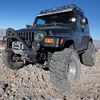I want to buy my first DSLR, but am open to mirrorless.
Sep 2, 2017 08:30:12 #
genocolo
Loc: Vail and Gasparilla Island
GregWCIL wrote:
You have a big decision to make and once you go a... (show quote)
Sep 2, 2017 08:31:16 #
berchman
Loc: South Central PA
MiraMeadows wrote:
Andy, going to research mirrorless..haven't really looked into them and they are lighter weight.
Give serious consideration to the Fuji X-T2 unless you *must* have full frame. Many Nikon shooters are transitioning to Fuji.
https://www.youtube.com/watch?v=_895hPva0ZY
Sep 2, 2017 08:32:34 #
Sep 2, 2017 08:40:55 #
Mark7829 wrote:
There is no weight savings with mirrorless. What weight they removed from the camera body was added back to the lens. Mirrorless lenses, weigh more than their counter parts. I am 66. I have a full frame set up and large primes, 500 and 400-200. They are heavy but not so much that I can't handle it.
*
Sep 2, 2017 09:33:35 #
burkphoto wrote:
Medium format gear is very heavy, and very, very e... (show quote)
Bill,
What an EXCELLENT post. I've read the entire thread and it's all great advice for anyone choosing a new camera system, but your post goes to the heart of the matter and gets the Blue Ribbon. I would show that post to anyone who might be considering buying a new camera. Thanks for taking the time to offer some very helpful information.
Sep 2, 2017 09:46:37 #
TomV
Loc: Annapolis, Maryland
markjay wrote:
Go mirrorless.
Unless you want to struggle learning the Sony system - don't go near it. The menus are unintelligible.
I personally have a Canon M5. I love it. It's fantastic. .
Go mirrorless.
Unless you want to struggle learning the Sony system - don't go near it. The menus are unintelligible.
I personally have a Canon M5. I love it. It's fantastic. .
Unintelligible menus? Really? I have been shooting with Sony for well over a decade. I can get a bit confused when trying my son-in-law's Nikon. The OP has no such history. She will have a learning curve regardless.
Sep 2, 2017 09:49:59 #
Sep 2, 2017 09:53:50 #
Sep 2, 2017 10:05:55 #
MiraMeadows wrote:
Hi all, I am wanting to buy my first serious camer... (show quote)
If you want a camera you will really enjoy, look at the Fuji line - XT-20 or XT-2. I am an older woman, and have had many Nikons since the 70's, but arthritis has caught up to me and I discovered the Fuji, Much easier to hold and manipulate, lighter weight, and has been designed to make the best compromises for the enthusiast photographer. The lenses are small and super quality, and all the controls are external - you don't have to hunt through menus once you have set up the camera to suit your preferences. My poor Nikons are sitting in a drawer. I have not yet gotten around to selling them!
Sep 2, 2017 10:07:22 #
Mark7829 wrote:
There is no weight savings with mirrorless. What weight they removed from the camera body was added back to the lens. Mirrorless lenses, weigh more than their counter parts. I am 66. I have a full frame set up and large primes, 500 and 400-200. They are heavy but not so much that I can't handle it.
I agree and disagree. If you add a heavy lens you are 100% correct. No weight savings... But with the Sony a6000/6300/6500 and kit lens huge weight savings. My guess is it is the same with other mirrorless cameras...
Sep 2, 2017 10:18:26 #
Mark7829 wrote:
There is no weight savings with mirrorless. What weight they removed from the camera body was added back to the lens. Mirrorless lenses, weigh more than their counter parts. I am 66. I have a full frame set up and large primes, 500 and 400-200. They are heavy but not so much that I can't handle it.
You obviously have not handled a Fuji X. The lenses are smaller and lighter than their Nikon counterparts. I have both. That is not to say that the Fuji equipment is lightweight. Where Nikon uses a lot of plastic, Fuji sticks to solid metal and glass - top quality materials and construction, and superb IQ.
Sep 2, 2017 10:25:39 #
berchman
Loc: South Central PA
CatMarley wrote:
You obviously have not handled a Fuji X. The lenses are smaller and lighter than their Nikon counterparts. I have both. That is not to say that the Fuji equipment is lightweight. Where Nikon uses a lot of plastic, Fuji sticks to solid metal and glass - top quality materials and construction, and superb IQ.
Fuji's versatile and excellent 18-135 zoom lens is on my camera all the time and it is a hell of a lot lighter and smaller than Nikon's 24-120 which was on my D800 all the time.
Sep 2, 2017 10:31:09 #
CatMarley wrote:
You obviously have not handled a Fuji X. The lenses are smaller and lighter than their Nikon counterparts. I have both. That is not to say that the Fuji equipment is lightweight. Where Nikon uses a lot of plastic, Fuji sticks to solid metal and glass - top quality materials and construction, and superb IQ.
Agree. I was going to do a lens-by-lens comparison, but I don't have the time right now. Check out the 16mm Fuji and compare weights with the Nikkor 16 2.8 You have to compare apples to apples..... the weight argument is weak, at best. A lot of the negatives posted about mirrorless no longer apply.
Sep 2, 2017 10:36:55 #
CatMarley wrote:
You obviously have not handled a Fuji X. The lenses are smaller and lighter than their Nikon counterparts. I have both. That is not to say that the Fuji equipment is lightweight. Where Nikon uses a lot of plastic, Fuji sticks to solid metal and glass - top quality materials and construction, and superb IQ.


Fuji has always made excellent products especially lenses.
Sep 2, 2017 10:51:35 #
MiraMeadows wrote:
Hi all, I am wanting to buy my first serious camer... (show quote)
Go to a store and see them in person. A mirrorless camera will be somewhat lighter than a normal DSLR but sometimes I think that a small camera with small buttons might actually be harder to hold and push buttons than a larger camera with larger and more spaced out buttons. In any case, once you put a pro lens on a mirrorless camera that is going to bring the weight up. If you are serious about mirrorless, I'd probably look at Sony first. They seem to be #1 in that department. I doubt that the other companies will let that stand for long though. As far as Canon or Nikon full frame bodies go, they are both fine pieces of equipment and I wouldn't hold it against you for choosing either. At the time I bought my first DSLR I went with Canon because my girlfriend at the time had just bought one and we could learn the buttons and menus together. I also looked at the prices and compared to Nikon they were a little less expensive and had a few more lenses to choose from. Now that is not true except for the lens part. I think Canon still has more lenses to choose from. Now that I know more about both Nikon and Canon I'd have to say that more people say that the Canon lenses lend themselves better to doing portraiture and any kind of pictures with people. I say this because I've heard it over and over again. But Nikon has an advantage with landscape photography supposedly because of the resulting colors and detail. I think Canon had the advantage over Nikon in the wildlife department, but now they are more even and Nikon could possibly be slightly ahead with their D500 body. In any case, they will always be competitive and one will edge over the other from time to time.
If you go to the store and look at them ask the sales person to show you the menus of a Canon and a Nikon. I personally think the Canon menu system is more intuitive than Nikon. There you have it. My general opinion on Nikon and Canon. One thing you are absolutely correct about, once you choose one, you are married to it. I have a $7000 lens, a $5500 lens, a $3500 body, a $2000 body and several $2000 lenses. It would be hard to switch to Nikon and take the hit on getting rid of all this expensive hardware and start over buying the same expensive lenses and bodies.
If you want to reply, then register here. Registration is free and your account is created instantly, so you can post right away.





